#womensupportingwomen
Text
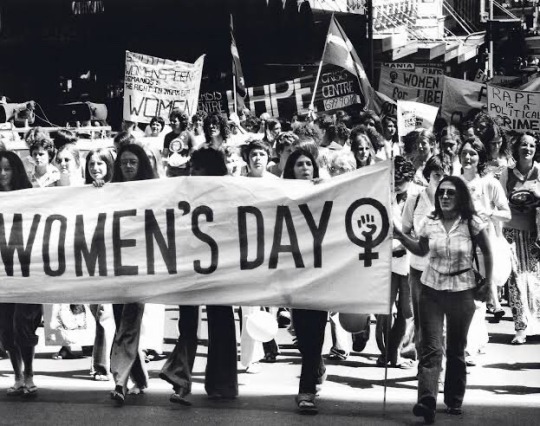
“there's no limit to what we, as women, can accomplish.”
#international women's day#8 march#womens day#womensupportingwomen#woman rights#happy women's day#woman
1K notes
·
View notes
Text
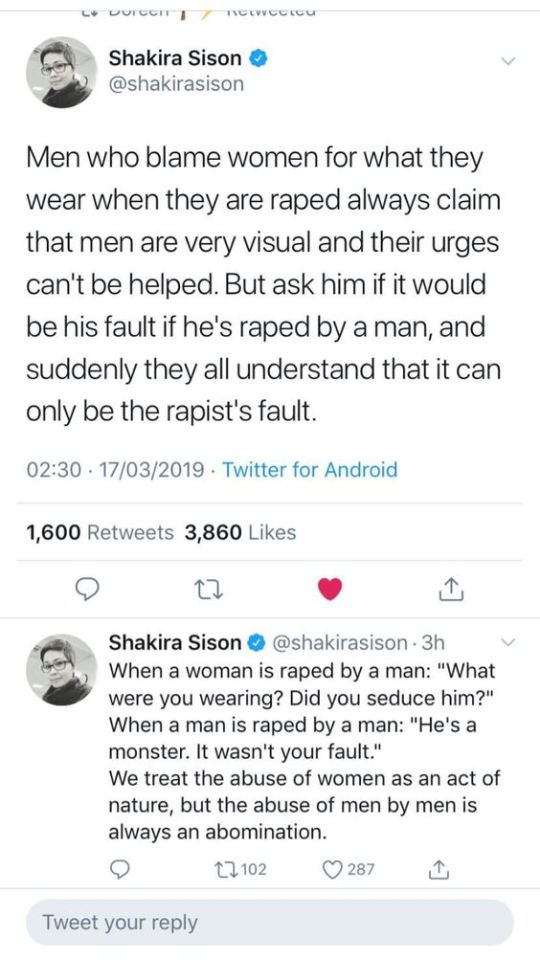
#feminist#female liberation#intersectional feminism#liberal feminism#patriarchy#women rights#iran protests#women movement of iran#islamic republic of iran#human rights#iranian protests#morality police#iranian women#iran protest#beautiful women#gay girls#sapphic#womens health and fitness#black women#womensupportingwomen
1K notes
·
View notes
Text
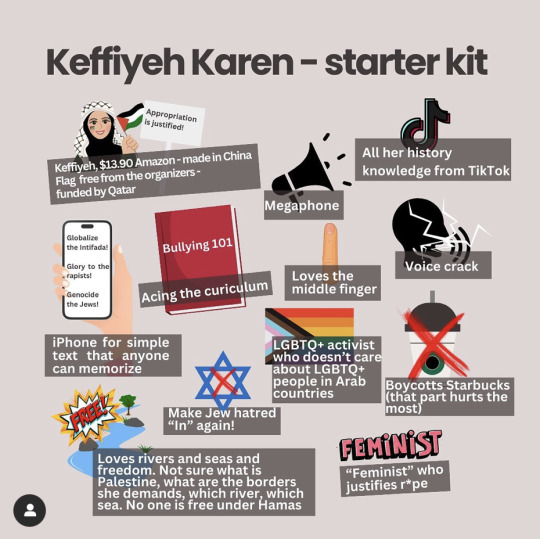
If you saw a pro-Hamas rally in the past 4 months you saw her - the Keffiyeh Karen.
A 20-something woman with deep blind convictions and a strong whiff of fascism.
She heard about the Middle East on October 7th and her white-saviorism/Jew-hatred awoke.
She finally found a cause where she belongs - to support terror, justify r*pe, and oppose indigenous people’s rights - because you know, Israel is the ancestral homeland of the Jews.
She is yelling so loud that her voice invariably fails and cracks. She desperately looks at her phone as if memorizing “Globalize the Intifada” is somehow difficult to do.
She abandons all her convictions of peace, fairness, LGBTQ+ rights and women’s rights to satisfy her Jew-hatred and tribalism.
Let’s call her what she is - a Keffiyeh Karen. Acronym KK. Add one more K and she will be complete.
dr__naama
#istandwithisrael#israel#gazawar#thewestisnext#keffiyeh#woke#fascism#rally#feminism#womensupportingwomen#antiterror#lgbtq#lgbtqia#lgbtqpride#standwithisrael#amyisraelchai#jew#zionism#neveragain#defundunrwa#jewish#israeli#palestine#racism
68 notes
·
View notes
Text

Supergirl 3x5
Lets ignore the fact that Sam was also sitting next to Lena
#cw supergirl#lena luthor#supergirl#kara zor el#supercorp#supercorp endgame#kara danvers#supercorp fanart#kara x lena#dc comics#supercorp fanfic#supergirl fanart#supercorp zine#supergirledit#women in suits#gorgeous women#womensupportingwomen#womenempoweringwomen#wlwsource#wlw blog#wlw pride#wlw post#wlw love#wlw
689 notes
·
View notes
Text
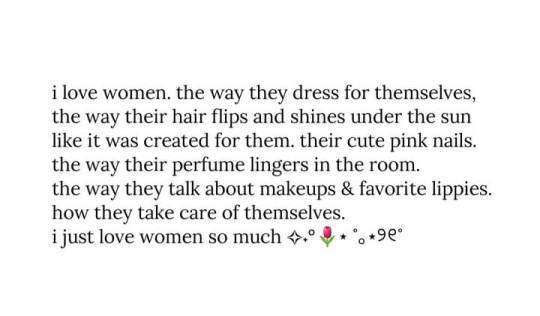
i love my pretty girls! 🤍🌷🎀
#girlblogger#girlblogging#girlbloggeraesthetic#pinterest girl#aesthetic#lana del rey#pinterest aesthetic#coquette aesthetic#coquette#soft girl#softcore#womensupportingwomen#girly blog#girly girl#girls like girls#dolettecore#dolette aesthetic#dolette#womenempoweringotherwomen#girly aesthetic#glamour
118 notes
·
View notes
Text
Reminder that women are perfect and should be allowed to kill
#wlw#lesbian#wlw ramble#wlw love#wlw positivity#wlw pride#wlw yearning#this is a wlw post#wlw blog#woman positivity#womanhood#womensupportingwomen
333 notes
·
View notes
Text


Happy international women's day girls!
Let's make the patriarchy burn heheheee
#international women's day#womens day#FUCK YEAH WOMEN#8 march#womensupportingwomen#woman rights#happy women's day#woman#art#feminist art#girl power#feminism#digital art#artwork#illustration#doodlysketch#my art
46 notes
·
View notes
Text
I apologize on behalf of those who have perpetuated such harmful actions and attitudes towards women. I recognize that the marginalization and subjugation of women is an ongoing issue that has pervaded societies for centuries and has caused immeasurable pain and suffering. I acknowledge the need to take responsibility, not only for the actions of individuals but also for the structures and attitudes that enable and encourage misogyny, sexism, and the objectification of women.
I understand the importance of listening to and amplifying women's voices, helping to build and participate in safe spaces for them, and working towards the eradication of gender bias and prejudice in all areas of life. I pledge to reject all forms of toxic masculinity and to work towards creating a more inclusive, equal, and just society where all people are respected and treated with dignity and fairness.
Over the centuries, males and patriarchal systems have inflicted various forms of harm upon women, including but not limited to:
1. Violence: Women have been subjected to physical, emotional, and sexual violence by men, including domestic violence, rape, sexual assault, and harassment.
2. Discrimination: Women have been discriminated against in various areas of life, including education, employment, politics, and the legal system.
3. Objectification: Women have been objectified by men, reducing them to mere sexual objects and devaluing their worth as human beings.
4. Stereotyping: Women have been stereotyped by men and society, limiting their opportunities, and denying them equal representation and participation in various fields.
5. Marginalization: Women have been marginalized and excluded from decision-making processes, perpetuating gender inequality and limiting their power and influence.
These harmful actions and attitudes have caused immeasurable pain and suffering for women, undermining their overall well-being and hindering their ability to live fulfilling lives. It is crucial to acknowledge and address these issues to create a more equitable and just society for all.
Patriarchal systems have inflicted various forms of harm on women, including but not limited to:
1. Economic exploitation: Patriarchal systems have often excluded or discouraged women from participating in the workforce, resulting in lower pay, limited job opportunities, and lack of access to economic resources.
2. Political disenfranchisement: Patriarchal systems have often excluded women from political decision-making, resulting in limited representation and opportunities for women to voice their concerns and needs.
3. Social marginalization: Patriarchal systems have often perpetuated gender stereotypes that limit women's participation and representation in social spheres such as education, media, and entertainment.
4. Sexual and gender-based violence: Patriarchal systems have often enabled and normalized sexual harassment, assault, and gender-based violence against women, perpetuating a culture of victim-blaming and silencing.
5. Health disparities: Patriarchal systems have often limited access to reproductive health services, resulting in increased maternal mortality rates and limited access to medical care.
These forms of harm have perpetuated gender inequality and oppression, preventing women from reaching their full potential and living fulfilling lives. It is crucial to recognize and address these issues to create a more equitable and just society for all.
Patriarchal systems have perpetuated sexual and gender-based violence against women in various ways, including:
1. Blaming the victim: Patriarchal systems often place the blame on the victim of sexual assault or harassment rather than the perpetrator, perpetuating a culture of victim-blaming and silencing.
2. Normalizing violence against women: Patriarchal systems often normalize violence against women in the media, entertainment industry, and other social spheres, desensitizing people to the severity and impact of this violence.
3. Perpetuating gender stereotypes: Patriarchal systems often perpetuate gender stereotypes that portray men as dominant and aggressive and women as submissive and passive, enabling and justifying sexual violence against women.
4. Limiting access to justice: Patriarchal systems often limit women's access to justice by creating patriarchal judicial systems that do not take into account the lived experiences and needs of women.
5. Enabling cultural practices that are harmful to women: Patriarchal systems often enable harmful cultural practices such as female genital mutilation, forced marriage, and honor killings, which perpetuate gender-based violence against women.
It is essential to recognize and challenge these harmful practices and attitudes to create a safer and more equitable society for women. This can involve education and awareness-raising campaigns, legislative changes, and policy reforms, among other measures.
Cultural biases can affect women's ability to access justice in patriarchal systems in various ways, including:
1. Stereotyping of women: Cultural biases in patriarchal systems often perpetuate gender stereotypes that portray women as weaker, less credible, and less deserving of justice than men. These attitudes can affect how women are perceived by law enforcement officials, judges, and other justice system participants.
2. Blaming the victim: Cultural biases can also lead to a culture of victim-blaming, where women who have experienced gender-based violence are blamed for their own victimization instead of holding the perpetrator accountable. This can discourage women from reporting crimes or pursuing legal action.
3. Failure to recognize women's rights: Cultural biases in patriarchal systems can also lead to a failure to recognize women's rights, including their right to equal protection under the law and their right to be free from discrimination and violence. This can make it difficult for women to access justice and to have their voices heard in the justice system.
4. Lack of representation: Cultural biases can lead to a lack of representation of women in positions of power in the justice system, including law enforcement, the judiciary, and legal professions. This lack of representation can affect how women are treated and the extent to which their experiences are understood and taken into account.
5. Cultural practices: Cultural practices such as honor killings or forced marriage can affect how women are treated in the justice system. These practices often prioritize the interests of families or communities over those of individual women, which can limit women's ability to access justice.
It is essential to recognize and address these cultural biases to promote gender-sensitive justice systems that take into account the lived experiences and needs of women. This can involve education and awareness-raising campaigns, as well as legal and policy reforms to promote gender equality and women's rights.
The lack of representation of women in positions of power in the justice system can affect the treatment of women in various ways, including:
1. Limited understanding of women's experiences: Men who dominate decision-making positions in the justice system may not have a full understanding of women's experiences with gender-based violence and other issues that disproportionately affect women. This can lead to a lack of empathy and understanding for women seeking justice.
2. Stereotyping of women: Without adequate representation of women in positions of power in the justice system, gender stereotypes can go unchallenged, perpetuating harmful attitudes that can negatively impact women seeking justice. For example, male judges or law enforcement officials may be more likely to stereotype women as "overemotional" or "hysterical" and less likely to believe them when they report gender-based violence.
3. Lack of role models: The lack of women in positions of power in the justice system can also limit opportunities for women to advance in their careers and can discourage women from pursuing careers in the legal profession. This can create a cycle of limited representation, where women are underrepresented at all levels of the justice system.
4. Narrow perspectives: The lack of representation of women in positions of power in the justice system can lead to a narrow focus on issues that affect men more than women. This can lead to a lack of attention to issues such as reproductive rights, domestic violence, and sexual harassment.
It is essential to promote gender equality and increase the representation of women in positions of power in the justice system to ensure that women's needs and experiences are taken into account and that their voices are heard. This can involve policies and programs aimed at increasing the representation of women in the legal profession, as well as training and awareness-raising campaigns for law enforcement officials and judges.
There are several steps that can be taken to address a lack of understanding, empathy, and sensitivity towards women in positions of legal and judicial decision-making in a systematic and institutionalized way, including:
1. Education and Training: Educational and training programs can be developed for judges, prosecutors, and other legal professionals to increase their understanding of gender-based violence, gender stereotypes, and the impact of cultural biases on women's access to justice. This can help to develop empathy, understanding, and sensitivity towards women's experiences.
2. Gender-sensitive Case Management: Legal institutions can incorporate gender-sensitive case management practices to ensure that women's experiences are taken into account in legal proceedings. This can include measures such as gender-sensitive questioning, evidence collection, and case preparation.
3. Gender Mainstreaming: Gender mainstreaming involves analyzing policies, programs, and practices through a gender lens to ensure that they are responsive to the needs and experiences of women. Legal institutions can integrate gender mainstreaming into their programming to ensure that policies and practices are gender-sensitive and that women's experiences are taken into account.
4. Representation: Efforts must be made to increase the representation of women in positions of power in the legal system. This can involve policies and programs aimed at recruiting and promoting women in the legal profession, as well as awareness-raising campaigns and advocacy to address gender bias in legal institutions.
5. Collaboration with Civil Society: Legal institutions can work in collaboration with civil society organizations and women's groups to promote gender-sensitive legal processes and practices. Civil society organizations can provide support services to women seeking legal redress for gender-based violence, and they can advocate for changes in legal institutions to address gender bias and promote gender equality.
Institutionalizing these steps and implementing them consistently would help to address the lack of understanding, empathy, and sensitivity towards women in positions of legal and judicial decision-making in a systematic and long-term way.
There are several strategies that can be used to increase the representation of women in the legal system, including:
1. Mentorship and Networking: Mentorship programs can be developed to provide guidance and support to women who are entering the legal profession. Networking opportunities, such as events and conferences, can also be organized to connect women with other professionals in the field.
2. Flexible Work Arrangements: Offering flexible work arrangements, such as part-time or remote work, can help to accommodate women's caregiving responsibilities and make it easier for them to balance work and family responsibilities.
3. Recruitment and Retention Policies: Legal institutions can adopt recruitment policies that prioritize diversity and inclusion, including the hiring of women and other underrepresented groups. Retention policies that support the advancement of women within the legal profession can also help to promote gender diversity.
4. Gender Sensitivity Training: Legal institutions can provide gender sensitivity training to staff and leadership to increase awareness of the issues facing women in the legal system and to promote a culture of inclusion and respect.
5. Addressing Gender Bias: Legal institutions can take concrete steps to address gender bias, including the implementation of policies that promote equal pay, the elimination of gender-based discrimination, and the promotion of diversity and inclusion.
6. Advocacy: Women's groups, civil society organizations, and legal professional associations can advocate for gender equality in the legal system by raising awareness of the issues facing women and advocating for policy changes that promote gender diversity and inclusion.
By implementing these strategies, legal institutions can work towards increasing the representation of women in the legal system and creating a more gender-diverse and inclusive legal profession.
There are several strategies that can be used to increase the representation of women in the legal system, including:
1. Encouraging Women to Pursue Legal Careers: This can be done by providing mentorship and networking opportunities, offering internships and scholarship programs, and engaging with women's groups and organizations to promote legal careers to young women.
2. Addressing Gender Bias: Legal institutions can take concrete steps to address gender bias, including the implementation of policies that promote equal pay, the elimination of gender-based discrimination, and the promotion of diversity and inclusion.
3. Promoting Work-Life Balance: Offering flexible work arrangements, such as part-time or remote work, can help to accommodate women's caregiving responsibilities and make it easier for them to balance work and family responsibilities.
4. Supporting Women in Leadership Roles: Legal institutions can provide support and development opportunities for women in leadership roles, including mentorship, training, and networking opportunities.
5. Advocacy: Women's groups, civil society organizations, and legal professional associations can advocate for gender equality in the legal system by raising awareness of the issues facing women and advocating for policy changes that promote gender diversity and inclusion.
6. Policies to Retain Women in the Legal Profession: Legal institutions can adopt retention policies that support the advancement of women within the legal profession, including offering professional development opportunities, establishing a diverse and inclusive workplace culture, and providing family-friendly policies and benefits.
By implementing these strategies, legal institutions can work towards increasing the representation of women in the legal system and creating a more gender-diverse and inclusive legal profession.
#end masculinity#fight the patriarchy#feminism#fuck the patriarchy#gynarchy#femalesupermacy#female led relationship#proud misandrist#misandry#yes all men#yes all of them#men are trash#men are the worst#men are the problem#give up your manhood#matriarchy#my post#smash the patriarchy#stop killing women#womensupportingwomen#divine feminine
41 notes
·
View notes
Text
In one minute he grabs my hands, in the next his eyes gag my voice, God alone knows why he made man, who instead of loving makes her regret her choice.
Kalavathi Raj, QUOTUS
#poetry#spilled ink#poets on tumblr#spilled words#my poem#spilled feelings#quotes#poem of the day#daily poem#dead poets society#original poem#poems on tumblr#poems and poetry#original writing#spilled poetry#spilled truth#quoteoftheday#inspiring quotes#quote#life quote#life quotes#women writers#womensupportingwomen#beautiful women#indian women#beauty#overcoming shame#shameless#no shame#fear
25 notes
·
View notes
Text
In case nobody told you today, you are beautiful. Please don't forget that 💙🩷🤍🩷💙
#trans#transgender#lgbt#lgbtq#lgbtqia#mtf#transwomen#trans women are beautiful#trans women are amazing#trans women are valid#womensupportingwomen#beautiful#trans women positivity#trans positivity#postivity post#positivity
22 notes
·
View notes
Photo
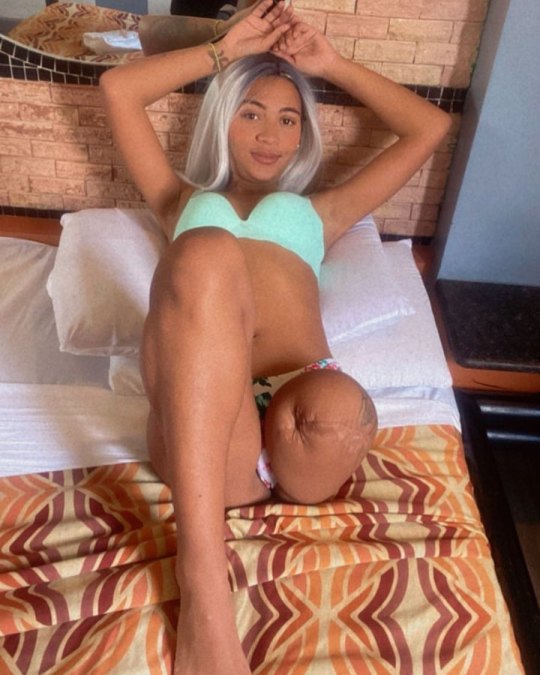
AMPUTEE KEYLA! NEW VIDEO LINK IN BIO! https://boosty.to/amputeemodelagency #amputee #oneleg #amputeefetish #toefetish #devotee #devotees #legless #stumplegs #womanpower #womensupportingwomen #girlpower #girls #crutcheslife #onelegchallenge #onelegged #friendly #friendlymatch #withoutleg #hoppinggirl #latino #bitchplease #followforfollowback #follow4followback #followmefollowyou #likeforlikes #likeforlikeback #like4likes #followlike #amputiert #amputation https://www.instagram.com/p/CqI_lihoU78/?igshid=NGJjMDIxMWI=
#amputee#oneleg#amputeefetish#toefetish#devotee#devotees#legless#stumplegs#womanpower#womensupportingwomen#girlpower#girls#crutcheslife#onelegchallenge#onelegged#friendly#friendlymatch#withoutleg#hoppinggirl#latino#bitchplease#followforfollowback#follow4followback#followmefollowyou#likeforlikes#likeforlikeback#like4likes#followlike#amputiert#amputation
160 notes
·
View notes
Text

ALISSAAAA gluz - white !! i'm extremely late for international women's day i wanted to draw this but anyway just remembered that it's never too late to love and admire women and their power and their delightfulness and their charm and their like EVERYTHING !! #ILOVEWOMEN hugs to all the girls & women & anyone else who identifies theirselves as a girl !!
#alissagluzwhite#arch enemy#death metal#melodic death metal#metal music#metalhead#metal girl#girl power#beautiful women#fanart#artists on tumblr#ilovemetal#womenempowerment#internationalwomensday#happywomensday#womensupportingwomen#international women's day#alissa white gluz#i love women#women power#womeeeen#iwanttohugeveryoneandeverythingthatsexistingsm#small art account#small artwork#doodle#photoshop art#digital arwork#illustration
21 notes
·
View notes
Text

Katie McGrath and Melissa Benoist on the set of Supergirl
#cw supergirl#lena luthor#supergirl#kara zor el#supercorp#supercorp endgame#kara danvers#supercorp fanart#kara x lena#marvel#melissa benoist#katie mcgrath#supercorp fanfic#supergirl fanart#supercorp zine#supergirledit#womenempoweringwomen#women in suits#womensupportingwomen#gorgeous women#women
575 notes
·
View notes
Text
I haven't seen anything prettier than a budding friendship between two women, regardless of their ages; Ah! The sight of two souls of the same kin syncing! What can possibly be deeper than a woman caressing the scars of another woman? They do that, not because they sympathize, but because they carry the same scars, the unseen kind, visible only to the eyes of those who have endured. What's more beautiful than the solace of a soldier in a war that is found in the calming shoulder of another?
-Sabina Yesmin
#aesthetic#spilled ink#spilled thoughts#writeblr#writers on tumblr#my words#my writing#poem#positivity#quotes#sabina yesmin#sabinayesmin#sapphic#womensupportingwomen#womenempowerment#women loving women#romantic academia#wise sayings#deep things
19 notes
·
View notes
Photo

I'm excited to announce my next 2023 convention guest appearance is at @grandecon1 in Grande Prairie, AB Canada July 14-16, 2023! I'm looking forward to returning to Canada and seeing you all! Grande Con is a wonderful con that fundraises for @odyssey_house , a non-profit organization and registered charity. They provide safety, security, and support for women and their children who are victims of domestic violence, are in crisis, or are in need of a housing alternative. #npo #latina #domesticviolenceawareness #domesticviolence #bodypositive #alberta #womensupportingwomen #grandeprairie #cosplayofcolor #cosplay #fyp #fypシ #latinacreators #nonprofit https://www.instagram.com/p/CoWC3LZryuV/?igshid=NGJjMDIxMWI=
#npo#latina#domesticviolenceawareness#domesticviolence#bodypositive#alberta#womensupportingwomen#grandeprairie#cosplayofcolor#cosplay#fyp#fypシ#latinacreators#nonprofit
167 notes
·
View notes
Text
Normalize 👏🏻 Lesbians 👏🏻 in 👏🏻 ALL 👏🏻 media👏🏻
That is all ✨💞
#lesbian#sapphic#wlw pride#wlw#lgbtqia#lgbt pride#girls who love girls#gay girls#sapphism#sapphic yearning#gaylife#womensupportingwomen#culture#lesbian culture
415 notes
·
View notes